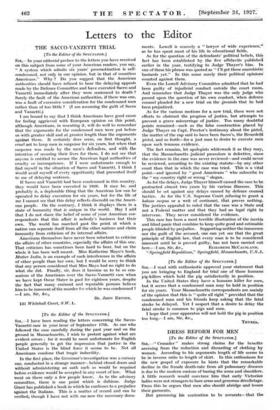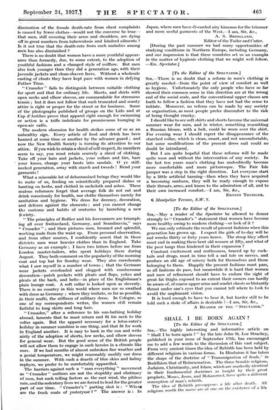DRESS REFORM FOR MEN [To the Editor of the SPECTATOR.]
Sin,—" Crusader " makes strong claims for the benefitS, accruing from the reduction and discarding of clothing by women. According to his arguments length of life seems to be in inverse ratio to length of skirt. In this enthusiasm for the new gospel of exposure he hints that the remarkable decline in the female death-rate from all pulmonary diseases is due to the modern custom of baring the arms and shoulders. A little research would convince him that early Victorian ladies were not strangers to bare arms and generous décolletage. From this he argues that men also should abridge and lessen their garments.
But presuming his contention to be accurate--that the
diminution of the female death-rate from chest complaints is caused by fewer clothes—would not the converse be true- . that men, still covering their arms and shoulders, are dying off in great numbers from tuberculosis and kindred ailments ? Is it not true that the death-rate from such maladies among men has also diminished ?
There is no doubt that women have a more youthful appear- ance than formerly, due, to some extent, to the adoption of youthful fashions and a changed style of coiffure. But men also look younger than they did a generation ago, with their juvenile jackets and clean-shaven faces. Without a wholesale casting of clouts they have kept pace with women in defying Father Time.
" Crusader " fails to distinguish between suitable clothing for sport and that for ordinary, life. Shorts, and shirts with open necks and elbow sleeves, are commendable for strenuous tennis ; but it does not follow that such truncated and scanty attire is right or proper for the street or for business. Some of the photographs published of groups on the Lido and at Cap d'Antibes prove that apparel right enough for swimming or action is a trifle indelicate for promiscuous lounging in open-air cafés.
The modern obsession for health strikes some of us as an unhealthy sign. Every article of food and drink has been banned at some time or another by the advance guard ; and now the New Health Society is turning its attention to our attire. If you wish to retain a shred of self-respect, its members seem to say, you must retain scarcely a shred of clothing. Take off your hats and jackets, your collars and ties, bare your knees, change your boots into sandals. 0 ye stiff- necked generation, away with starch and tweeds ! Rend your garments !
What a miserable lot of dehumanized beings they would like to make of us, feeding on scientifically prepared dishes or banting on herbs, and clothed in sackcloth and ashes. These zealous reformers forget that average folk do not eat and drink consciously for health, nor clothe themselves merely for sanitation and hygiene. We dress for decency, decoration, and defence against the elements ; and you cannot change the customs and habits of centuries by launching a new Swiety.
" The principles of Rollier and his forerunners are triumph- ing all over Switzerland, Germany, and Scandinavia," says Crusader " ; and then pictures men, bronzed and splendid, working nude from the waist up. From personal observation, and from other sources, I confidently assert that in those districts men wear heavier clothes than in England. Take Germany as an example ; I have two letters before me from London master-tailors, who spent holidays there during August. They both comment on the popularity of the morning coat and top hat for Sunday wear. They also corroborate what I saw myself in a number of towns ; that the Germans wear jackets overloaded and clogged with cumbersome decoration—patch pockets with pleats and flaps, yokes and pleats at the back, and belts—in place of the Englishman's plain lounge coat. A soft collar is looked upon as slovenly. There is no country in this world where men arc so swathed With dress as Germany ; where they imitate, so far as possible, in their mufti, the stiffness of military dress. In Cologne, so one of my correspondents writes, the women still remain faithful to long skirts and long hair.
" Crusader," after a reference to his sun-bathing holiday abroad, laments that he must return and fit his neck to the collar again. But the apparel necessary for a lotus-eater's holiday in summer sunshine is one thing, and that fit for work in England another. It is easy to bask in the sun and write airily of the adoption of shorts, low necks, and elbow sleeves for general wear. But the good sense of the British people will not allow them to engage in such heroics in a climate like ours. If we had months of almost unbroken fine weather and a genial temperature, we might reasonably modify our dress in the summer. With such a dearth of blue skies and balmy zephyrs, we prefer to be comfortably apparelled.
The barriers against such a " sans everything " movement as " Crusader " outlines are not the stupidity and obstinacy of men, but such telling factors as the east wind, the pitiless rain, and the sedentary lives we are forced to lead for the greater part of our time. " Crusader's " parting shot is : " Where are the frock coats of yesteryear ? " The answer is : In Japan, where men have discarded airy kimonos for the trimmer and more useful garments of the West.—I am, Sir, &c., A. S. BRIDGLAND, Editor of the Tailor and Cutter.
[During the past summer we had many opportunities of studying conditions in Northern Europe, including Germany, and our impression is that these countries set us an example in the matter of hygienic clothing that we might well follow. —En. Spectator.]











































 Previous page
Previous page